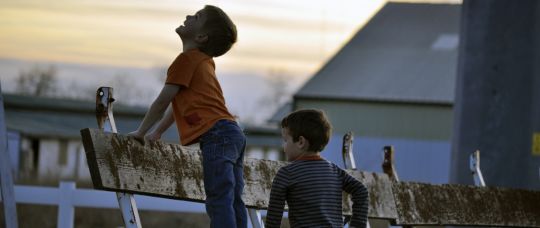Barn Schooling can be a fantastic supplement to your educational format. Among the countless benefits from working around a barn, the obvious perks are the responsibility kids gain from working with animals, the bond children develop with their animals, and the exercise barn chores and riding provide. Barn schooling can also provide practical incentives, attention building skills, and academic enrichment.
My oldest two children range in age from 8 to 15 years old. That’s a seven-year difference. Even with such a large age gap, both children have learned to depend on others and to be dependable from barn schooling. My oldest has had to extend her patience to critters and to her brother while measuring out feed and supplements or asking for help measuring the feed. Other times, she must wait for her brother to complete a task that would have taken her less time to do. Both children have to care for a barn full of horses and barn cats and complete various other barn chores. My children are solely responsible for keeping these animals fed, cleaned, healthy, and properly secured in fences or stalls. One slip-up could mean hungry horses, colicky ponies, or loose animals. Animals give children opportunities to hone their responsible sides.
Both my son and daughter have a horse to care for. These horses need respect, love, and care. My children have become aware—sometimes painfully—that these living creatures have feelings. The greatest reward for my children and for me as their mother is to see their horses bonding with them.
My son’s pony and my daughter’s horse prefer the children to anyone else. They look to them for comfort and offer love and comfort back. My eight-year-old trained his pony for riding this summer. Before he could even begin the training, he had to prove to his pony that he was a rider worthy of respect, love, and loyalty. I love to watch the two boys in the round pen. When my son knows he has his pony’s attention, he turns his back on him, smiles from ear to ear, and listens for the familiar sounds of little hooves walking up to him. The smile doesn’t fade as my youngster runs around the pen with a pony close at his heels. When the saddle and riding training began, they had already formed a bond. This created a way for them to learn each other very quickly and to speed up the training process. They reached a successful riding level within weeks.
Another wonderful effect of barn schooling is the exercise and weightlifting my kids do. Do you know how much a wheel barrow full of manure weighs? Or how strong one must be to wheel it through mud to a manure pile, lift it, and turn it over to dump? Neither did my children until it became their job. Saddles are also heavy and must be put away over their heads on saddle racks. Both my kids have increased their muscle mass. My daughter has slimmed down several sizes in only a year’s time.
Since my kids love to go to the barn and groom and feed their horses, I can use this as incentive to get them to do other things they’re less enthusiastic about. Before we can go to the barn, our house pets must be cared for, school work needs to be completed, the vacuum needs to be swung around, and dinner has to be prepped. I’ve received helpers in the kitchen when least expected simply because my kids want me to hurry along and get to the barn with them. The kitchen garbage miraculously goes out. The living room gets vacuumed. The laundry ends up on my bed in neatly folded piles while the hamper load decreases—all because my children can’t wait to go work in the barn!
My son, who would normally be bouncing off the walls and wiggling all over the floor while working on his times tables, sits quietly on the couch with a marker in hand, completing a white board full of problems. My daughter has learned to work through her fear of tackling a challenge from working with horses. This has translated to how she approaches her essays and math assignments.
But my favorite part of barn schooling is the impromptu lessons: “Let’s see what kind of spider that is, Mom!” “Did you see the tadpoles have gotten their legs now?” “How do you tell the age of a horse by his teeth?” “What is Cushing’s Disease?” These questions require research papers or projects to display what they’ve learned.
Since both my children are learning to train and break horses, they enjoy critiquing horse magazine articles. This gives me subject matter for assignments. Sometimes I don’t even have to make assignments because my children create projects for themselves.
Overall, barn schooling has exponentially assisted in my children’s development—academically, socially, and occupationally.
Working in the barn has increased my children’s capacity for responsibility, become an incentive for learning, encouraged them to help family members, and extended their attention span. And best of all, my children have experienced the unconditional love they give and receive as they work with their horses each day.
Lisa Blauvelt (with her family and three dogs, two cats, a horse, pony, donkey, two red eared turtles, a fluctuating number of tadpoles and baby fish, and various other creatures collected by her adventurous boys) puts her education degrees to work at her home in the Deep South. There she teaches not only her own children, but others who come to her home to learn. Her decade long experience in teaching children to read will soon be published as a 476 page guide for parents.

